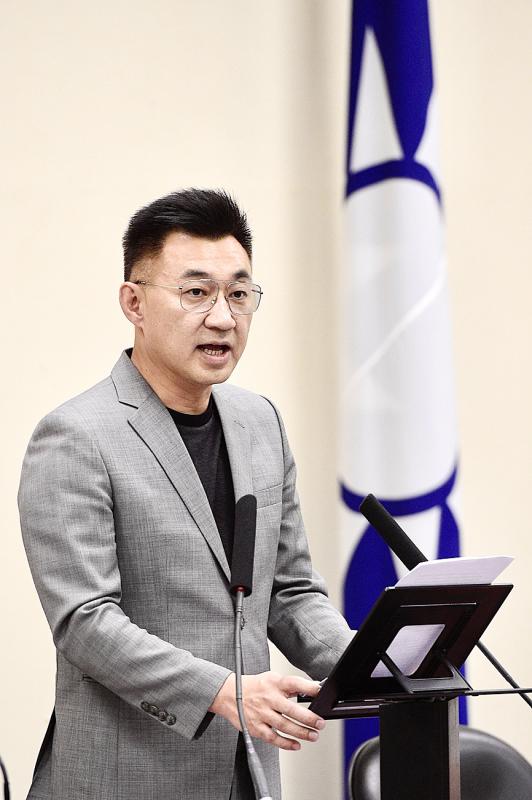The Chinese Nationalist Party (KMT) plans to propose constitutional amendments to require the president to give an annual state of the nation address to the Legislative Yuan and for the appointment of the premier to be approved by lawmakers, while working with other parties to ensure that the Control Yuan and the Examination Yuan can operate independently, KMT Chairman Johnny Chiang (江啟臣) said yesterday.
Presiding over the weekly meeting of the KMT’s Central Standing Committee, Chiang cited survey results from a my-formosa.com poll that found that 71.5 percent of the respondents support the idea of an annual presidential address on national policy issues and the economy to the legislature, while 62.8 percent said the president’s nomination of a premier should be approved by the legislature.
The same poll also found that 43.9 percent of respondents felt that the Democratic Progressive Party (DPP) has hurt the nation’s democratic system by the way it handled the nomination and approval of new Control Yuan members, he said.

Photo: George Tsorng, Taipei Times
About 52 percent said incoming Control Yuan president Chen Chu (陳菊) would not represent the people, he added.
“The basis for our discussions about the constitutional amendments should be to defend our democracy and crack down on the abuse of human rights,” Chiang said.
Under the Republic of China’s political system, the honor of the president is based on their exercising self-discipline, rather than on a balance of powers between the branches of government, he said.
As such, the president has many executive privileges, but bears no responsibility, he said.
The way the Control Yuan nominations were handled shows how a president can destroy the balance of power by a lack of self-discipline, he added.
While the KMT would petition the Council of Grand Justices for a ruling on the constitutionality of the approval of new Control Yuan member, it also plans to conduct a comprehensive review of the Constitution to ensure that the nation’s political system can hold the president accountable, prevent the abuse of executive rights and has a clear separation of powers, Chiang said.
The KMT needs to find the most advantageous position between the US and China, and develop its relations with both nations using a flexible foreign policy, given the conflicts between them, he said.
“President Tsai Ying-wen (蔡英文) had said that we should not forget we are one of the chess players as well. We want to remind Tsai that she should cautiously tread in diplomatic waters. Her priority should be an independent Republic of China and the nation’s 23 million people,” Chiang said.
“She should avoid turning Taiwan into a bargaining chip between the two countries — or an abandoned child,” the KMT chairman added.

Taiwan is stepping up plans to create self-sufficient supply chains for combat drones and increase foreign orders from the US to counter China’s numerical superiority, a defense official said on Saturday. Commenting on condition of anonymity, the official said the nation’s armed forces are in agreement with US Admiral Samuel Paparo’s assessment that Taiwan’s military must be prepared to turn the nation’s waters into a “hellscape” for the Chinese People’s Liberation Army (PLA). Paparo, the commander of the US Indo-Pacific Command, reiterated the concept during a Congressional hearing in Washington on Wednesday. He first coined the term in a security conference last

DEFENSE: The National Security Bureau promised to expand communication and intelligence cooperation with global partners and enhance its strategic analytical skills China has not only increased military exercises and “gray zone” tactics against Taiwan this year, but also continues to recruit military personnel for espionage, the National Security Bureau (NSB) said yesterday in a report to the Legislative Yuan. The bureau submitted the report ahead of NSB Director-General Tsai Ming-yen’s (蔡明彥) appearance before the Foreign and National Defense Committee today. Last year, the Chinese People’s Liberation Army (PLA) conducted “Joint Sword-2024A and B” military exercises targeting Taiwan and carried out 40 combat readiness patrols, the bureau said. In addition, Chinese military aircraft entered Taiwan’s airspace 3,070 times last year, up about

A magnitude 4.3 earthquake struck eastern Taiwan's Hualien County at 8:31am today, according to the Central Weather Administration (CWA). The epicenter of the temblor was located in Hualien County, about 70.3 kilometers south southwest of Hualien County Hall, at a depth of 23.2km, according to the administration. There were no immediate reports of damage resulting from the quake. The earthquake's intensity, which gauges the actual effect of a temblor, was highest in Taitung County, where it measured 3 on Taiwan's 7-tier intensity scale. The quake also measured an intensity of 2 in Hualien and Nantou counties, the CWA said.

The Overseas Community Affairs Council (OCAC) yesterday announced a fundraising campaign to support survivors of the magnitude 7.7 earthquake that struck Myanmar on March 28, with two prayer events scheduled in Taipei and Taichung later this week. “While initial rescue operations have concluded [in Myanmar], many survivors are now facing increasingly difficult living conditions,” OCAC Minister Hsu Chia-ching (徐佳青) told a news conference in Taipei. The fundraising campaign, which runs through May 31, is focused on supporting the reconstruction of damaged overseas compatriot schools, assisting students from Myanmar in Taiwan, and providing essential items, such as drinking water, food and medical supplies,